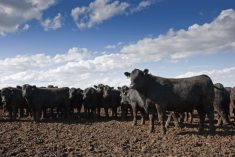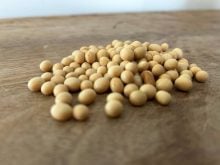For the week ending Feb. 1, Western Canadian feeder cattle markets traded steady to $8 per hundredweight higher compared to seven days earlier. In some cases, larger packages of quality genetics were up as much $15/cwt from the prior week. The market was quite variable but definitely had a stronger tone. Alberta packers were buying fed cattle on a dressed basis at $460/cwt, up $10-$15/cwt from the week ending January 25. Using a 60 per cent grading, this equates to a live price of $276/cwt delivered. Break-even pen closeouts are around $262/cwt. The healthy margin structure appeared to bolster buying enthusiasm from Alberta feedlot operators. Buyers appeared to shrug off the looming U.S. tariffs that had been threatened to start Feb. 4 as confidence surfaced that the bulk of the punishment would be shouldered by the U.S. consumer.
Read Also

Prairie CWRS bids rise, other wheats mixed
Canada Western Red Spring (CWRS) wheat bids across the Prairie provinces saw some strength during the week ended Nov. 11, taking some direction from the United States futures. However, other wheat classes were mixed.
In central Alberta, larger frame lower flesh tan mixed steers averaging 1,000 pounds on light grain and silage diet with full processing data sold for $353. At the Lloydminster sale, Simmental based steers averaging 905 pounds left the crowd gasping by selling for $386. Northwest of Winnipeg, Simmental blended heifers with medium to lower flesh levels averaging 926 pounds sold for $334.
In central Saskatchewan, larger frame Angus cross steers with lighter butter levels with a mean weight of 835 pounds were last bid at $390. In the same region, lower flesh Simmental based heifers averaging 860 pounds were last bid at $352.
Southeast of Calgary, larger-wide frame Limousin steers weighing just over 700 pounds were valued at $440. North of Calgary, medium to larger frame mixed heifers with a mean scale number of 720 pounds supposedly sold for $395.
In Manitoba, Charolais based steers averaging 625 pounds reportedly settled at $463. In north-central/central Saskatchewan, Charolais steers on the card at 630 pounds reached up to $497 and British based medium frame steers around 615 pounds sold for $475. Southeast of Saskatoon, medium frame run-of-the-mill mixed heifers weighing just over 600 pounds were valued at $425.
In central Alberta, Angus cross heifers weighing 560 pounds were valued at $464 and mixed black thin heifers averaging 500 pounds supposedly moved through the ring at $495. At the Ponoka sale, red mixed steers scaled at 584 pounds on light grain, barley and silage diet traded for $509. At the Rimbey sale, a smaller package of mixed steers a shade over 500 pounds were last bid at $540.
The implementation of U.S. tariffs and Canadian retaliatory measures were delayed for 30 days at the last minute, but the threat remains.
President Trump believes that the U.S. trade deficit with Canada suggests that Canadians have somehow, unfairly taken advantage of Americans. Apparently, Canadians have been smarter and outtraded our American counterparts. President Trump feels that tariffs are imperative to level the playing field. Beef demand is inelastic. A small change is supply has a large influence on price. Wholesale beef prices have been trading at or near historical highs over the past month as U.S. and Canadian packers anticipate the tariffs. The U.S. border is currently closed to Mexican feeder cattle which is enhancing prices. A tariff on beef and cattle will drive U.S. beef prices to unprecedented levels so fresh tariffs may not have much of an influence on the feeder market.
— Jerry Klassen is president and founder of Resilient Capital, specializing in proprietary commodity futures trading and market analysis. Jerry consults with feedlots on risk management and writes a weekly cattle market commentary. He can be reached at 204-504-8339 or via his website at ResilCapital.com.















